Slide Glossary
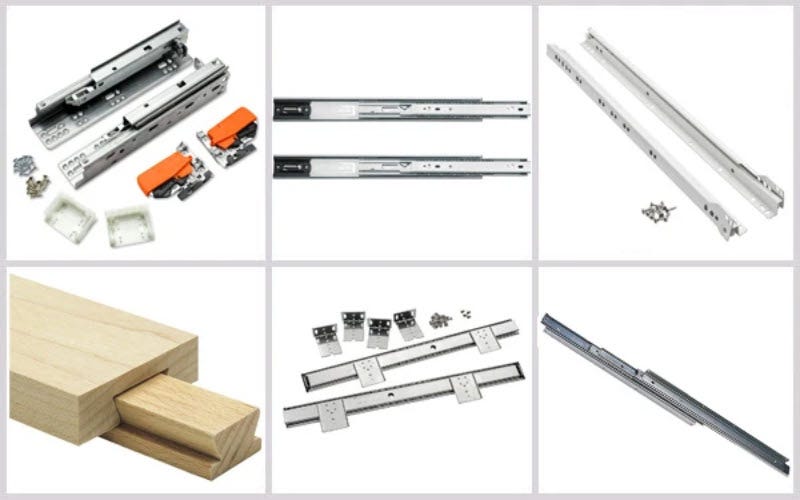
What are the different types of drawer slides and parts of a slide? This glossary includes all the important terms you need to know related to drawer slides and drawer slide installation. Understanding these terms will help you select the best hinge for your project.
Shop Our Selection of Drawer Slides
Ball-Bearing SlidesRefers generally to any type of drawer slide that rides on ball bearings. Ball bearing slides are extremely durable and can be built to support large loads. They very often offer full-extension or over-travel for better access to all of the drawer's contents. |
 |
Bracket MountingA mounting method whereby the slide is mounted to brackets at the front and/or rear of the cabinet, rather than directly to the cabinet wall or face frame. |
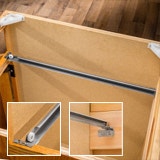 |
Cam AdjustmentA feature of some slides that lets you adjust the position of the drawer by turning a cam screw clockwise or counter-clockwise. Ensures the smoothest, quietest action by ensuring the slides are parallel, and can also be used to adjust the position of the drawer front. Compare for reference with Manual Adjustment, which uses a slotted mounting hole. |
Cabinet MemberThe part of a drawer slide that attaches to the cabinet. |
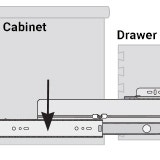 |
Center-Mount SlideA single drawer slide that mounts to the center of the bottom of the drawer. These are offered in wooden versions, or in metal versions with either a roller that rides in a track, or a flat-mounted ball-bearing slide. |
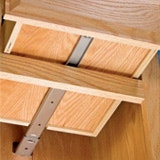 |
DetentA feature of some drawer slides that holds the drawer in the closed position or the open position. When you open or close a drawer with this feature, you will feel a dull click. This is the detent engaging to hold the drawer closed. |
Drawer MemberThe part of the drawer slide that attaches to the drawer box. |
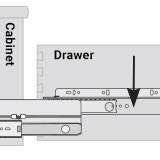 |
Epoxy SlideAn older, but still common type of drawer slide with a small nylon wheel on the drawer member that rides in the track of the cabinet member, and a similar wheel at the front of the cabinet member. Also sometimes referred to as a "Euro slide" or a "roller slide." The word "epoxy" refers to the durable finish—the slides themselves are metal. Epoxy slides typically do not offer full extension. The drawer members typically mount to the bottom of the drawer, but are exposed when the drawer is opened. |
 |
Friction DisconnectA feature of some side-mount ball-bearing slides that lets you remove the drawer without tools by simply pulling past the increased friction at the end of its travel. |
Full-ExtensionA drawer slide that extends out from the cabinet the full length of the slide, providing easy access to all or most of the drawer's contents. |
 |
Handed Drawer SlidesA pair of slides consisting of a dedicated left- and right-hand slide. The slides are not interchangeable. Many undermount slides are handed. |
Heavy-Duty Drawer SlideA slide specifically designed to support more weight than usual. Used for demanding applications like large file drawers, tool drawers and truck bed drawers. |
 |
Keyboard SlideA type of slide specifically designed to hold a keyboard tray. Typically includes brackets for mounting to the underside of a desk, plus a pair of short ball-bearing slides. |  |
Lever DisconnectA feature of many side-mount ball-bearing slides that allows you to remove the drawer without tools. To remove the drawer, just press the small lever on each slide, then pull on the drawer. |
 |
Manual AdjustmentRefers to slotted holes in the drawer member and cabinet member that allow you to adjust the position of the drawer front to back and up or down. Compare for reference with Cam Adjustment. |
 |
Over-TravelA feature of many side-mount ball-bearing slides that lets you pull the drawer completely out of the cabinet and then some, providing full access to the contents of the drawer, even if the drawer is directly under the countertop overhang. These slides are also popular with file drawers where being able to pull out files at the very back of the drawer is important. Also used with full-inset drawers where the face frame creates an added obstruction at the front of the drawer's travel. |
 |
Self-CloseA feature of some drawer slides that pulls the drawer closed in the final few inches of travel. Epoxy slides have this feature by default, utilizing a ramped track. Ball-bearing slides sometimes offer this feature as an option, and will be marked accordingly. Soft-close slides are a sub-type of self-closing slide. |
 |
Side ClearanceThe required amount of clearance on either side of the drawer for mounting a particular type of slide. Epoxy slides and side-mount ball-bearing slides require specific side clearances for proper operation, usually 1/2" for the most common varieties. Side clearances vary, and are sometimes variable, depending upon your choice of brand, model and type: side-mount, undermount or center-mount. |
 |
Side-Mount Drawer SlideA type of drawer slide that mounts to the side of the drawer box. Side-mount ball-bearing slides can be mounted anywhere on the side of the drawer box. Epoxy slides straddle the bottom edge, and are therefore sometimes called "bottom-mount." We categorize them as side-mount slides because they show on the side of the drawer, and they require specific side clearances. |
 |
Slide LengthRefers to the length of the slide itself. This is most often a nominal number. If space in the cabinet is tight, be sure to check the spec sheet to verify the exact length. |
Soft-CloseA feature of higher-end drawer slides that eases the drawer shut in the final few inches of travel. Uses a dampening mechanism to reduce noise and wear-and-tear on the slide. |
Static Load RatingThe amount of weight a drawer slide is designed to support. If your drawer needs to support a large amount of weight, look for "heavy-duty" drawer slides and check the spec sheets to match the slide to your need. |
Telescoping MovementThe action of a slide with multiple nested members that extend outwards, much like an old-fashioned telescope. Side-mount ball-bearing slides are an example. |
 |
Touch Release/Touch-to-OpenA special feature of some slides that pops the drawer open after you push on the drawer front. Useful in modern cabinet styles where knobs and pulls would be undesirable. Sometimes called "push-to-open." |
 |
Undermount Drawer SlideA type of drawer slide that is totally concealed beneath the drawer when installed. Although Center-Mount slides are technically undermount, the term usually refers to high-end left/right pairs that are full-extension by default, and often feature soft-close. |
 |
3/4 ExtensionA drawer slide that extends out from the cabinet by approximately 75% of the length of the slide. Also called "partial extension." These slides are typically more affordable, and used when access to the full contents of the drawer is not critical. |
 |
Shop Our Selection of Drawer Slides
Keep the inspiration coming!
Subscribe to our newsletter for more woodworking tips and tricks